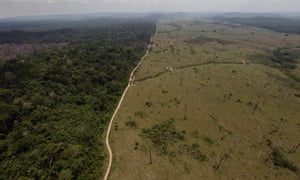The climate crisis is damaging the ability of the land to sustain
humanity, with cascading risks becoming increasingly severe as global
temperatures rise, according to a landmark UN report compiled by some of
the world’s top scientists.
Global heating is increasing droughts, soil erosion and wildfires while diminishing crop yields in the tropics and thawing permafrost near the poles, says the report by the Intergovernmental Panel on Climate Change.
Further heating will lead to unprecedented climate conditions at
lower latitudes, with potential growth in hunger, migration and conflict
and increased damage to the great northern forests.Global heating is increasing droughts, soil erosion and wildfires while diminishing crop yields in the tropics and thawing permafrost near the poles, says the report by the Intergovernmental Panel on Climate Change.
The report, approved by the world’s governments, makes clear that humanity faces a stark choice between a vicious or virtuous circle. Continued destruction of forests and huge emissions from cattle and other intensive farming practices will intensify the climate crisis, making the impacts on land still worse.

Such moves would also improve human health, reduce poverty and tackle the huge losses of wildlife across the globe, the IPCC says.
Burning of fossil fuels should end as well to avoid “irreversible loss in land ecosystem services required for food, health and habitable settlements”, the report says.
“This is a perfect storm,” said Dave Reay, a professor at the University of Edinburgh who was an expert reviewer for the IPCC report. “Limited land, an expanding human population, and all wrapped in a suffocating blanket of climate emergency. Earth has never felt smaller, its natural ecosystems never under such direct threat.”
Prof Jim Skea, from the IPPC, said the land was already struggling and climate change was adding to its burdens. Almost three-quarters of ice-free land was now directly affected by human activity, the report says.
Poor land use is also behind almost a quarter of the planet’s greenhouse gas emissions – the destruction of forests, huge cattle herds and overuse of chemical fertilisers being key factors.
The report recommends strong action from governments and business, including ending deforestation and enabling new forests to grow, reforming farming subsidies, supporting small farmers and breeding more resilient crops. Many of those solutions, however, would take decades to have an impact, the IPCC says.

“There is much more we could do in that space that we are not doing, partly because it is difficult,” said Pete Smith, a professor at the University of Aberdeen and a senior IPCC author. “You wouldn’t want to tell people what to eat, that would go down badly. But you could incentivise.”
The IPCC report suggests “factoring environmental costs into food”. Previous studies have suggested meat taxes, or subsidised fruit and vegetables. Meat production ties up most farmland and cutting consumption could release millions of square kilometres for forestry or bioenergy crops, the report says, as could cutting food waste.
Caterina Brandmayr, of the Green Alliance thinktank, said: “The key message from the IPCC is urgency: we need to act now to plant new forests, restore our ecosystems, and, yes, to eat less meat.”
David Viner, a professor at the University of East Anglia and a senior IPCC author, said: “Land is a vital resource and we have to look after it if we are going to have a sustainable future.”

No comments:
Post a Comment